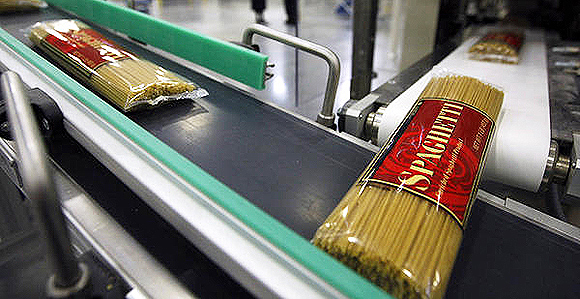Church Announces Updates to Food Storage, Emergency Preparedness
Contributed By Jason Swensen, Church News associate editor

The Church announced plans that their facilities will supply families and community agencies with “finished goods,” such as pasta, pancake mix, and flour, to be used for food storage. Photo by Chelsey Allder, Deseret News.
Article Highlights
- The Church plans to produce more finished products such as pasta, pancake mix, and flour.
- Raw wheat will still be available for purchase.
Related Links
The Church has announced plans to supply families and community agencies with “finished good” such as pasta, pancake mix, and flour—rather than raw wheat, which can be difficult to process at home.
“In the next several years we anticipate increasing food donations to community charities by more than 20 million pounds annually,” said Bishop Gérald Caussé, Presiding Bishop of The Church of Jesus Christ of Latter-day Saints.
Increased donations of flour and other related products will allow the Church to more effectively assist those in need.
Latter-day Saints have a long history of applying Christ’s commandment to “love one another” by donating their labor and sharing essential food to people in need, according to a Church news release.
“Food storage is a foundational principle of self-reliance, taught to Latter-day Saint families worldwide,” added Sister Jean B. Bingham, Relief Society General President and a member of the Church’s Welfare and Self-Reliance Executive Committee.
“Just as the Church adapts food production and storage projects according to changing needs, families may want to make similar adjustments from time to time in their food storage plans to ensure availability for their own use and to share with others.”
The Church has long encouraged families across the globe to keep their food storage current as personal circumstances and local regulations allow.
For many Latter-day Saint families, the benefit of setting aside a reliable supply of food storage was recently evident in the aftermath of Hurricane Florence in North Carolina. (See related story.)
Many drew upon reserves of food and water in the challenging days following the storm when provisions were scarce. Fortunately, the disaster did not result in long-term shortages. But family preparedness offered precious peace of mind during a period of uncertainty.
“The recent decision to convert a portion of our stored grain into finished products is an example of adapting to changing situations,” said David Frischknecht, managing director of the Church’s welfare operations. “In this case, having the finished products helps us provide for needs more quickly, particularly in emergencies, and to share more readily with those in need.”
The conversion of a portion of the grain reserve into finished products necessitates some operational adjustments such as closing the Latty, Ohio, storage facility and increasing the volunteer hours at the Deseret Mill and Pasta Plant in Kaysville, Utah, according to the release.
The Church will continue to provide raw wheat for purchase through home storage centers and store.ChurchofJesusChrist.org and will seek to provide selected finished products that many members of the Church may find to be more convenient to use in a time of need.
